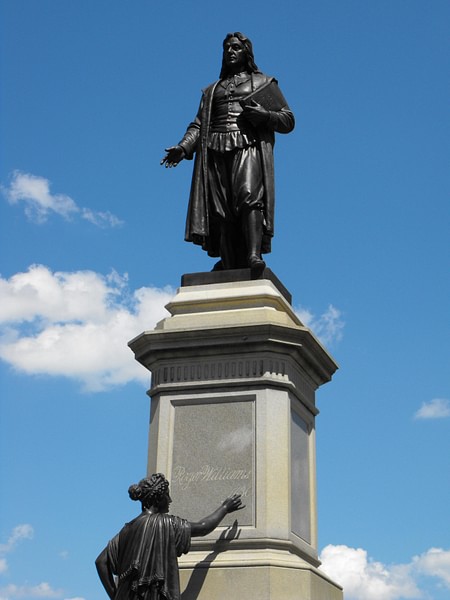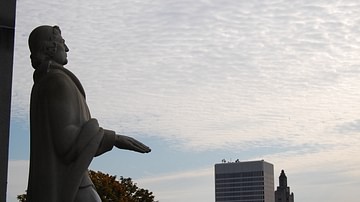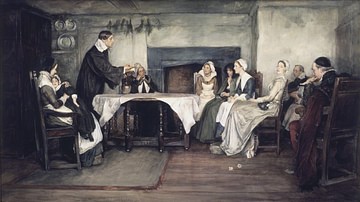
Roger Williams (l. 1603-1683 CE) was a Puritan separatist minister best known for his conflict with both the Plymouth Colony and Massachusetts Bay Colony in 1633-1635 CE, resulting in his banishment and founding of the colony of Providence, Rhode Island. Williams believed that the clergy of both Plymouth and Massachusetts Bay were corrupt in continuing to adhere to the concept of one's deeds as an important aspect of spiritual salvation rather than acknowledging the biblical precept that only God's grace grants salvation (Romans 8:32, Ephesians 2:8). Further, he claimed, these churches were still aligned with the basic policies of the Anglican Church they had supposedly rejected.
Williams is also well-known as an advocate for the separation of church and state (claiming that politics poisoned religious practice and belief), complete religious freedom, the abolition of slavery in the colonies of North America, and respect for Native Americans. One of his criticisms of the colonies of New England was that they felt free to take land from the Native Americans without payment. When he founded Providence, he paid the Narragansett tribe a fair price for the land.
Providence became the first successful liberal colony in New England which was not informed by Puritan ideals and theology. Anyone of any religion or ethnicity was welcome to settle there as long as they recognized the fundamental human right of what Williams called the "liberty of conscience" – the freedom to express one's self - especially in religious matters, without fear of persecution or reprisal. Providence was scorned by the Massachusetts Bay Colony, especially, as populated by riffraff, lunatics, and heretics but became one of the fastest-growing settlements in the region under Williams' vision and guidance. In the modern day, parks, schools, and memorials around Rhode Island are named in his honor.
Early Life & Migration
Roger Williams was born, probably in London, England, in 1603 CE, the son of a merchant, James Williams, and wife Alice. Records of his early life were lost in the Great Fire of London in 1666 CE. As a young man, he was educated first at Charterhouse School and then Cambridge University's Pembroke College where he mastered a number of languages including Dutch, French, Greek, Hebrew, and Latin. He was intensely interested in religious matters from a young age and studied to become an Anglican cleric. At Cambridge, however, he was drawn to Puritan theology and practice which would later set him at odds with the Anglican Church.
The Anglican Church, although founded in opposition to Catholicism, still retained a number of Catholic aspects in its organization, worship service, and beliefs. The Puritans were Anglicans who objected to any Catholic influences or observances in the Church and wished to 'purify' it, bringing it in line with the simple practices and beliefs of the first Christian community as depicted in the biblical Book of Acts. The more radical Puritans were known as separatists – those who felt the Anglican Church was wholly corrupted by Catholic influences and separated themselves from it completely – and, in time, Williams aligned himself with this theology and belief.
During his years at Cambridge, Williams was apprenticed to the famous jurist Sir Edward Coke (l. 1552-1634 CE), an independent and courageous thinker whose insistence on the concept of equality before the law brought him into conflict with the monarchy. Coke's unwavering stand for justice, as well as his practice of regularly speaking out against policies or even laws he considered unjust or inequitable, significantly influenced Williams' outlook and later actions.
The Anglican Church had replaced the pope with the English monarch as its head and so any criticism of the Church was considered treason against the crown. Throughout the reign of James I of England (1603-1625 CE), Puritans who voiced dissent were persecuted, fined, and jailed, some even executed, and under Charles I of England (r. 1625-1649 CE), these persecutions continued. Recognizing that England was no longer safe for an outspoken Puritan separatist, Williams left with his wife Mary in 1630 CE.
Arrival in Boston & Theology
He arrived at Boston, New England, in early 1631 CE and was offered a position as temporary pastor of the church there while the duly appointed minister, the Reverend John Wilson (l. c. 1588-1667 CE) was away in England. Williams refused the offer, however, because of differences he had with the magistrates of Boston and the Puritan Church. Although Williams was himself a Puritan, he identified more closely with the separatist view and considered the Boston church as too closely tied to Anglicanism. He also objected to their practice of punishing those who broke any of the Ten Commandments, arguing that doing so could be an expression of one's religious convictions and punishing someone for the act was the suppression of religious freedom. Williams claimed that everyone should be free to follow their own conscience in matters of religion without fear of punishment.

The Puritans of Boston were surprised by his reaction since he had already acquired a reputation as an orthodox Puritan preacher and theologian. Although there were a number of people of the Massachusetts Bay Colony who identified as separatists, they conformed to the Puritan vision as set down by their second governor, John Winthrop (l. c. 1588-1649 CE), who stressed the importance of maintaining an ordered collective of like-minded citizens in order for the colony to succeed. Scholar David D. Hall notes the differences between Puritans and separatists:
The Puritan movement was never monolithic. Some within the movement were moderates, others radical or conservative in how they wanted to remodel the church and refashion society. The radicals, who called for the abolition of the episcopacy, were succeeded by Separatists who condemned the Church of England as "unlawful". In the early seventeenth century a few radicals abandoned orthodox Calvinism and affirmed a Holy-Spirit-centered "spiritism". (204)
Williams was more closely aligned with this spiritism movement, which argued for the supremacy of liberty of conscience in religious matters as opposed to living by the letter of the law, citing St. Paul's assertion that "the letter [of the law] kills, but the Spirit [of the law] gives life" (II Corinthians 3:6). To Williams, one should live according to the spirit of Christian love and devotion; attention paid to rules and regulations only separated a believer from the path of Christ.
The church at Salem offered Williams a position which he was inclined to accept as this congregation was separatist but, under pressure from the Boston magistrates, Salem withdrew its offer. Williams then left to accept a position as minister for Plymouth Colony, the most famous separatist settlement in New England.
Plymouth Colony
Plymouth Colony had been founded in 1620 CE and, by the time Williams and his wife arrived, was thriving. Unlike Massachusetts Bay Colony, founded and populated by Puritans, Plymouth Colony had, from the start, been a settlement divided between Puritan separatists and Anglicans. These two factions had learned to live together under the secular, civil, law as set down in the Mayflower Compact which promised every male citizen over the age of 21 a voice in government and a vote on laws.

Williams seems to have regarded Plymouth favorably upon his arrival, and according to the Plymouth Colony's second governor, William Bradford (l. 1590-1657 CE), the feeling was mutual. In his Of Plymouth Plantation, Bradford writes:
Mr. Roger Williams, a godly and zealous man, with many rare qualities but a very unstable judgment, who settled first in Massachusetts, but owing to some discontent, left there, came here about this time [1631 CE], where he was made welcome according to their poor ability. He exercised his gifts among them, and after some time was admitted as a member of the church; and his teaching was highly approved. (Book II. ch. 14)
In time, however, Williams began to find fault with the Plymouth Colony on the grounds that it was too legalistic and, like Boston, still too closely aligned with the beliefs and practices of Anglicanism. He had also become aware that Plymouth Colony, like Massachusetts Bay, had never paid the Native Americans for the land they were on but had, instead, just taken it under the mistaken conceit that the king of England had the power to grant them other people's property. He claimed that Plymouth should pay the Native Americans of the Wampanoag Confederacy for the land or vacate it and, at the same time, learned the Algonquin language of the natives of the area and became friendly with them, notably with the chief Massasoit (l. c. 1581-1661 CE). Bradford notes how Williams' opinions finally drove him to leave Plymouth:
This year [1633 CE] he began to hold some strange opinions, and from opinion proceeded to practice. This caused some controversy between the church and him and, in the end, some discontent on his part, so that he left them somewhat abruptly. (Book II. ch. 14)
He returned to the Massachusetts Bay Colony and accepted a position as assistant pastor at the Salem church under the Reverend Samuel Skelton.
Massachusetts Bay & Banishment
The Boston magistrates called Williams to appear in court to answer for his "strange opinions" in December 1633 CE. They especially took offense to a tract he had written and published the year before, while at Plymouth, denouncing the English monarchy's policy of granting land in North America to English colonists without compensating the natives who lived there. Details of this hearing are unclear, but Williams was allowed to retain his position at Salem.
Skelton died in 1634 CE, and Williams became pastor of the Salem church. The magistrates in Boston were not pleased with this development, especially since it seems Williams had not stopped sharing his opinions as he was supposed to have done, and they called him to answer charges in court in March of 1635 CE. Williams claimed they had no authority over him because the apostolic charge given by Christ to his disciples had been diluted through the church's involvement with the state, beginning with the Roman emperor Constantine I's advocacy for Christianity as a state religion in 312 CE. Politics, Williams argued, poisoned the well of religious devotion by forcing religion to serve political ends. Whatever power the magistrates believed they had, Williams argued, it was not of God.

Winthrop and the other magistrates pressured the Salem church to expel Williams and, to save his church from trouble, he resigned and held private services open to anyone interested. Winthrop would not tolerate this concession, however, and had Williams back in court in October 1635 CE at which time he was convicted of heretical teachings and subversion. He was ordered to leave the colony but, due to illness and the severity of oncoming winter, was allowed a temporary stay of banishment on the condition that he stopped all preaching. Williams would not be silenced, however, and left the colony in January 1636 CE.
Providence Plantation & Conflict
He first traveled to the village of his Native American friends among the Pokanoket tribe and was taken in for the winter by Massasoit. In the spring, he purchased a plot of land from Massasoit for a new settlement but, after Williams and his company of followers from Salem had built their homes and planted their crops, Plymouth Colony objected that his settlement was on their land. Rather than object, on the grounds that Plymouth had never paid Massasoit for the land and so it was not actually theirs, Williams agreed to move to the other side of the Seekonk River where he bought another parcel of land from the Narragansett tribe and founded the colony of Providence Plantation.
Williams named his colony Providence because he felt divine providence had provided the land and he opened the settlement to anyone, regardless of their beliefs, who wanted to settle there. In order to become a citizen, one only needed the majority vote of male heads of households, but one's religious beliefs were not to be considered in said vote. In 1637 and 1639 CE, the colony further defined itself through civil agreements separating its government from religious matters; thus establishing the first settlement in what would become the United States of America which recognized the separation of church and state.
The first Baptist church was founded in Providence in 1638 CE, even though neither Williams nor the church's co-founder John Clarke was Baptist and neither were many others in the colony. Williams agreed with the Baptist policy of adult baptism, arguing that infant baptism was meaningless as the child had no concept of sin or grace, as well as the Baptist claim of the primacy of the Holy Spirit and the superiority of God's grace over good deeds regarding salvation. His personal convictions had nothing to do with establishing the church, however, as he made clear that anyone – Catholic or Quaker or Jew or any other – were free to set up whatever houses of worship they desired.
When the Pequot War (1636-1638 CE) broke out between the Pequot tribe and the other colonies, Williams acted as a mediator. Since he spoke the native's language fluently by this time, he was able to serve as interpreter between the parties. He persuaded his friends, the Narragansetts, to side with the colonists against the Pequots, which helped secure the colonial victory in the war, while keeping Providence neutral territory throughout the hostilities. Even though his efforts had been of great benefit to the Massachusetts Bay Colony and the others, his friendship with the Native Americans, the wealth of Providence, and the all-inclusive nature of its citizenship upset the other colonies who soon allied against it.
Conclusion
In 1643 CE, Williams was forced to return to England to procure a charter for the colony to legalize it and prevent Plymouth or Massachusetts Bay from taking it over. The charter was secured by 1644 CE and, while he waited in England, Williams wrote his famous work The Bloody Tenent of Persecution for Cause of Conscience which argued for religious freedom and the separation of church and state. His arguments are presented as a dialogue between Peace and Truth who both draw on the Bible to support their claims. Williams makes a number of assertions which are generally viewed as common sense in the modern era but were quite controversial at the time.
He claimed that secular government had no business in religious matters and a state should be founded on complete freedom for its citizens to pursue their goals in keeping with the liberty of conscience of each individual. The king had no business in persecuting anyone for religious dissent because whether one's religious faith was justified or false was finally known only to God. Persecuting others for minority beliefs, he noted, was not only bad for the persecuted but for everyone involved as it caused social unrest. Since a major tenet of Puritanism was that no one save God could know who was saved and who was damned, the clergy was overstepping its authority to charge those who held different opinions with heresy. The book was ordered burned, and Williams was to be arrested, but he had already left by then for North America.
Among Williams' other influential works were A Key into the Language of America (1643 CE), the first book on Native American language and customs in English, and his Letter to the Town of Providence (1655 CE) in which he further defined his ideal colony. In the Letter, he compares a commonwealth to a ship which can carry people who hold different beliefs. The captain of that ship may discipline anyone who disrupts the voyage or the peace of others but should never single out any one person or persons for persecution based on their individual beliefs. As long as everyone onboard treated each other with respect, those who commanded the vessel should only concern themselves with steering the ship and maintaining the crew and passengers, not with enforcing the command's religious preference. He concludes his letter with the line, "This, if seriously and honestly minded, may, if it so please the Father of lights, let in some light to such as willingly shut not their eyes" (Letter, 1). This philosophy would inform both the colony of Providence and the later state of Rhode Island.
The other colonies disagreed with Williams, however, and especially regarding his policies and friendship with the Native Americans. As more colonists arrived in New England, more land was taken from the natives, more treaties were made and broken by newly formed governments, and less respect was paid to those who had first held the land as their own. The colonists' policies finally resulted in the conflict known as King Philip's War (1675-1678 CE), during which Williams served as captain of the Providence Militia. The war was costly on both sides, and Providence was burned in 1676 CE before a colonial victory was won and Native American control of any part of the region lost.
Roger Williams died at Providence in 1683 CE of natural causes and was buried on his land. He continued to be admired by those of his own colony but was more or less forgotten by the others. In the 19th century CE, with the rediscovery of his written works, he was elevated to the level of almost a secular saint, especially for his advocacy of the separation of church and state. He remains a popular and powerful symbol for civil and religious freedom in the modern era, not only in the United States but also elsewhere, and his name is honored especially through memorials, parks, and schools in Rhode Island.





